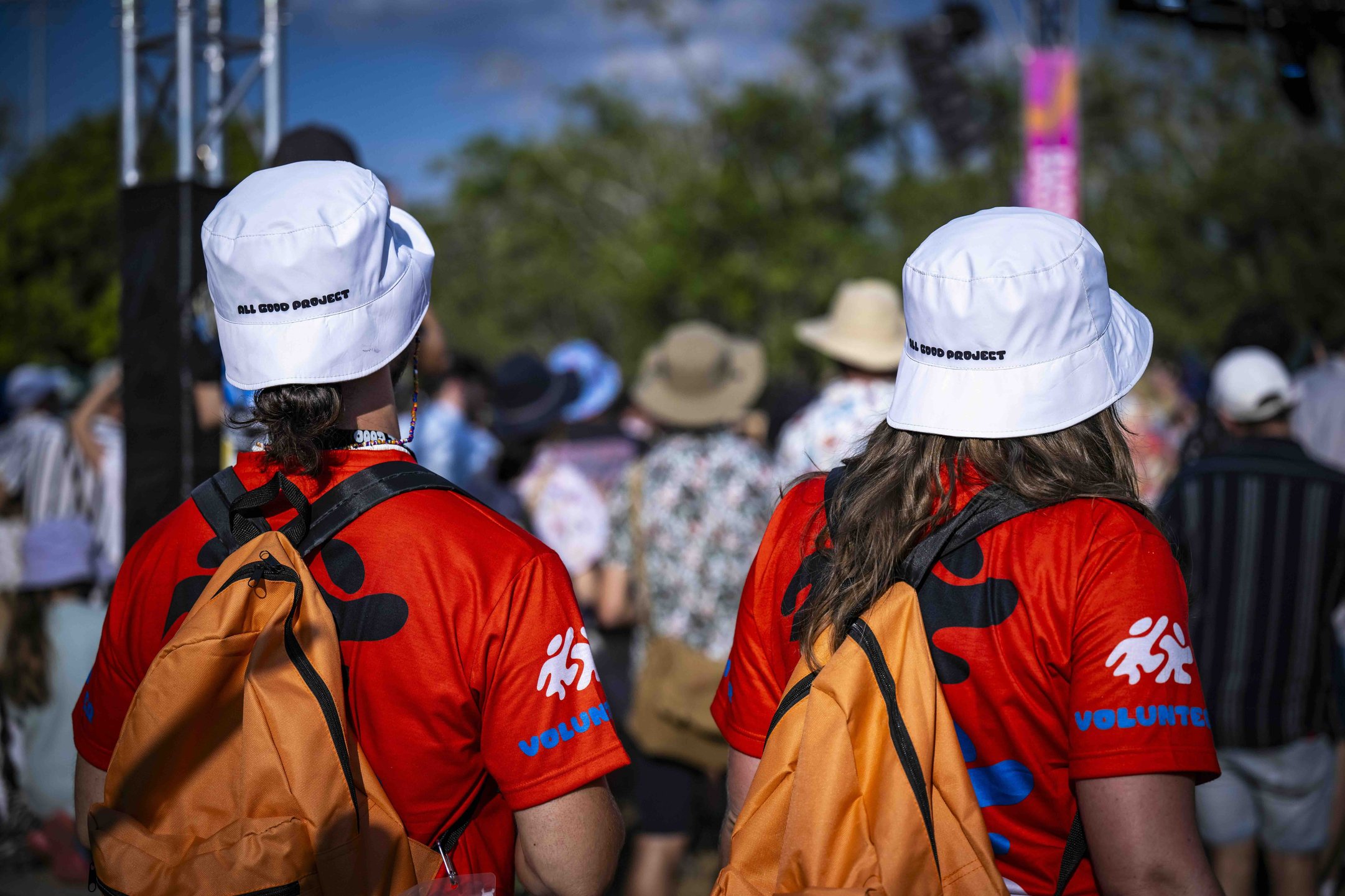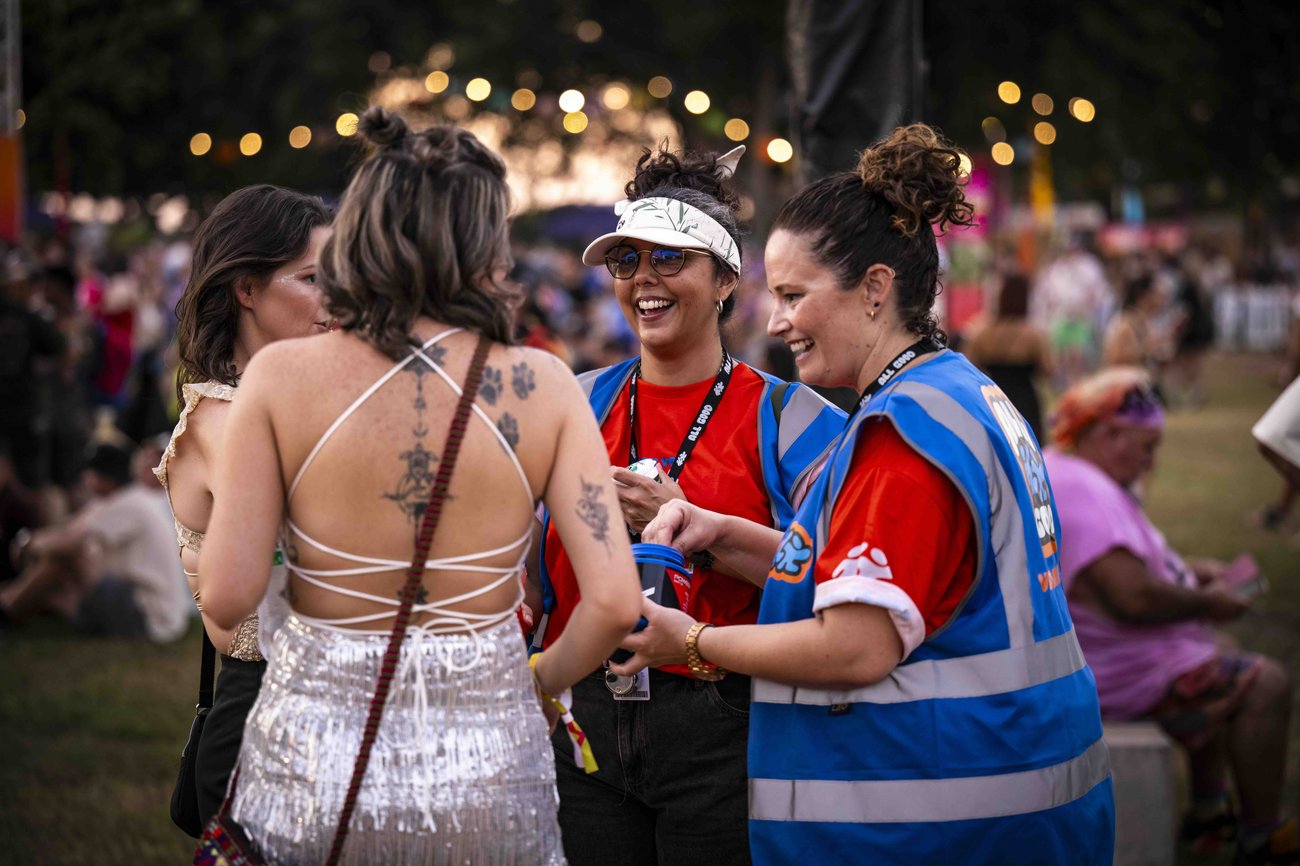
Spotlight: Pioneering festival harm reduction in the NT
The Darwin Local Drug Action Team has hit the ground running with a peer-led harm reduction program for live music - the first of its kind in the Northern Territory.
Darwin LDAT first trialled the new service at Bass In The Grass Festival in 2021. It was modelled on the evidence-informed DanceWize program from Victoria and New South Wales.
The NT trial was hugely successful, impacting thousands of festival-goers.
DanceWize has been around for over two decades. It takes a volunteer, peer-led approach to improve festival and event safety around alcohol and drug (AOD) use, respectful behaviour and sexual health.

Their challenge
Emma Gerard is the Safety Access and Equity Officer at MusicNT. The org runs the All Good Project which tackles both AOD harm and gender-based violence in live music spaces.
She explains that there was previously no harm reduction service in NT.
“There was a gap in the ecosystem of safety, and we’re interested in filling that gap.”
At festivals, usually there are volunteer helpers to give basic information like where to find the toilets, and at the next level, there’s St. Johns ambulance, providing medical treatment.
There was no harm reduction service in between to help prevent people from having an AOD-related medical issue in the first place.
And, with around 13,000 to 16,000 attendees every year, Bass in the Grass has a lot of people who could potentially experience health issues celebrating in hot weather all day long.
Their response
In the LDAT’s first Community Action Plan (CAP), a strong group of partner organisations got together to address this glaring community need. These local orgs were already involved in Bass In The Grass and healthcare in the region.
A consultant was hired to rework DanceWize for a Northern Territory context. In 2021, the trial went ahead for two years, and was a success. MusicNT was then identified as the best candidate to deliver the program under the All Good Project.
“The first CAP really created a package that any organisation could pick up and run with, including physical resources, “ Emma explained.
“It’s really wonderful. I got training from that consultant, who’s a medical professional with lots of expertise. And we consulted with Bass In The Grass Festival as well.”
Their progress
In the lead up to a big festival like Bass In The Grass, All Good now consults with organisers, offering advice on festival safety.
Then, on the event day their service includes a couple of main things.
There’s a pop-up care space tent, run by volunteers trained in basic harm reduction. People can come in for any combination of substance use, heat stroke, fatigue, feeling overwhelmed or minor mental health issues. The tent is strategically located next to the St John’s medical tent so medics can come in if needed.
There are education desks outside the tent and at the festival gates, where hundreds of curious patrons ask questions and find out what the All Good Project is about.
There’s also a roving team of five or six pairs of volunteers in highly visible orange uniforms. They carry backpacks full of harm reduction resources, like water, Hydralite, condoms, info pamphlets, fans, bucket hats, sunscreen and ear plugs.
“It’s most useful in preventative care to use the first half of the festival day to give out ear plugs and water, telling patrons to find any volunteers in orange if they feel unwell or have any issues later on,” said Emma.
“Our merch is an educational tool. It’s bringing people to you because they want the ear plugs, but you also have the opportunity to give harm reduction advice.”
In the evening, rovers are on the lookout for patrons who aren’t doing so well and need help.
Over two years at the festival, the All Good Project peer volunteers have attended to approximately 100 acute presentations. They’ve chatted with up to 2000 people at the education desks and interacted with or helped up to 3500 attendees on roving shifts.
Emma explains that the reach is even wider than just a brief interaction at the education desk.
“We’re interested in making sure people know what we’re doing and come to us in future. We work with local venues too. People see us at the festival then see our branding at a venue and know we’re a safe person to go to in case they get in to trouble.”
And the All Good Project continues to evolve and expand in line with community need.
Through its second Community Action Plan, the LDAT conducted a workshop in October 2023 to further map the current needs, risks and possible prevention activities needed to create positive AOD change in festival and music venue spaces in the NT.
Stakeholders identified a need for better training and recruitment of peer support leaders, who can model healthy behaviour and deliver accessible messaging to festival-goers.
The third Community Action Plan, now underway, is expanding the All Good Project by funding a peer support coordinator to deliver a total of 24 training workshops to 60 peer support leaders.
Advice to other LDATs
The Darwin LDAT has built really strong partnerships across many organisations in the community. These partnerships have evolved over the two years the project has been running. There’s now additional funding from the NT Primary Health Network.
“These partnerships are really important to the success of the program,” said Emma.
She also explained the other key aspect for LDATs is making sure they know what they’re doing works, and evaluating the programs as they go along.
Evaluation is built into each Community Action Plan, and MusicNT was also able to work with Menzies School of Health Research to evaluate the All Good Project.
The report showed that the All Good Project at Bass In The Grass positively impacted the festival environment and the wider community. Having that confirmation allows the LDAT to go ahead with confidence in what it’s doing.

